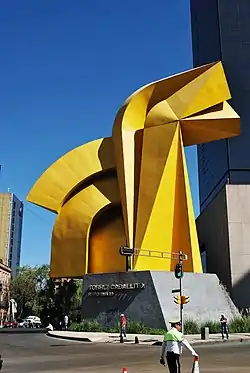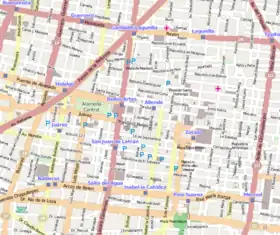| El Caballito | |
|---|---|
 The sculpture in 2011 | |
 El Caballito Location within Centro Histórico | |
| Artist | Sebastián |
| Year | 1992 |
| Medium | Steel sculpture |
| Location | Mexico City, Mexico |
| 19°26′10″N 99°08′58″W / 19.43608559°N 99.14942711°W | |
El Caballito, officially Cabeza de caballo ("horse's head"),[1][2] is an outdoor 28-metre (92 ft) tall steel sculpture by Sebastián (Enrique Carbajal) depicting a horse's head, installed along Mexico City's Paseo de la Reforma, in Mexico. It was dedicated on January 15, 1992.[3]
Enrique Carbajal (Sebastian) created the El Caballito monument under the Olmec conception. The El Caballito was installed in front of the Torre del Caballito, a high office building. The monument had to replace the Equestrian statue of Carlos IV which was removed from there in 1979, and also had to be some kind of chimney that would dissipate the vapors from deep drainage but wouldn't adversely affect the image of the Paseo de la Reforma.[4]
See also
References
- ↑ Corral, J. Francisco de Anda. "Sebastián recibirá la Medalla de Artes 2018 en la Universidad Anáhuac". El Economista. Archived from the original on 2018-11-23. Retrieved 2018-11-23.
- ↑ "El escultor Sebastian muestra su pasión por la física y sus fines estéticos". El Universal (in Spanish). 2018-11-08. Archived from the original on 2018-11-23. Retrieved 2018-11-23.
- ↑ "Sculpture "El Caballito" by Sebastian". Ciudad de México. Archived from the original on 23 November 2018. Retrieved 23 November 2018.
- ↑ "El Caballito". Mexican Routes [mexicanroutes.com]. Archived from the original on 2020-07-30. Retrieved 2019-11-29.
External links
 Media related to Cabeza de Caballo, Paseo de la Reforma at Wikimedia Commons
Media related to Cabeza de Caballo, Paseo de la Reforma at Wikimedia Commons
This article is issued from Wikipedia. The text is licensed under Creative Commons - Attribution - Sharealike. Additional terms may apply for the media files.